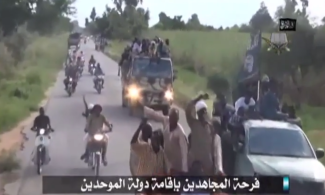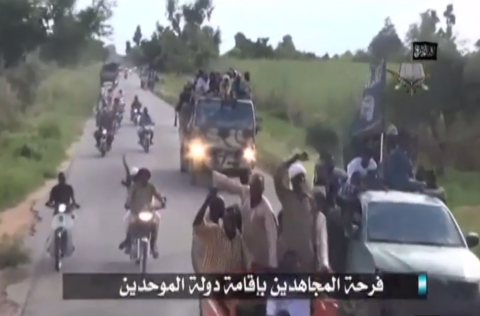
Personally, I am eager to listen to reasonable arguments about what Buhari would do specifically to combat Boko Haram if he wins next month's election, not rhetorical claims and decontextualized nostalgia. Like most Nigerians, I would like to know what he would do differently than what is already being implemented in the counter-insurgency effort of our armed forces. I would like to know what strategies, outside of what is already in practice, a president Buhari would deploy to deal with Boko Haram.
As the Boko Haram insurgency has intensified over the last few years, it has risen to the top of the priority list of problems most Nigerians expect the government to address. And in this election season, the Boko Haram terrorism problem has dominated conversations between the campaigns and among Nigerians.

President Jonathan’s supporters acknowledge that the insurgency has escalated under his watch despite his declaration of a state of emergency in several Northeastern states. But they argue that Boko Haram is being propped up by several forces and that the group’s murderous campaign is founded on multiple, intractable factors that are beyond a military solution.
If President Jonathan’s supporters have been defensive and even cynical in regard to Boko Haram, Muhammadu Buhari’s supporters have been bullish. They have seized on the issue to underscore the claim that their candidate would be a much stronger president than the incumbent. They have gone on the offensive and have declared with a certitude bordering on political hubris that their man will deal decisively with Boko Haram if he wins next month’s presidential election. To substantiate this boast, they point repeatedly to the way that Buhari, both as a divisional military commander and as military head of state, dealt with the Maitatsine uprising, which sporadically affected at least four cities in the North between 1980 and 1985. The argument, often advanced with gusto and simplistic comparative framing, is that Buhari would deal with Boko Haram the same way that he dealt with Maitatsine, implying that the Maitatsine strategy would be recycled to combat Boko Haram.
But is the comparison between Boko Haram and Maitatsine valid? Will the strategy that worked against Maitatsine be effective against Boko Haram? And is the world in which Boko Haram exists and flourishes the same as the one in which Maitatsine emerged and thrived?
Personally, I am eager to listen to reasonable arguments about what Buhari would do specifically to combat Boko Haram if he wins next month's election, not rhetorical claims and decontextualized nostalgia. Like most Nigerians, I would like to know what he would do differently than what is already being implemented in the counter-insurgency effort of our armed forces. I would like to know what strategies, outside of what is already in practice, a president Buhari would deploy to deal with Boko Haram.
So far, we are getting few substantive and specific answers to these questions. Instead, we are getting naïve declarations about Buhari’s almost magical ability to end Boko Haram. What I find disingenuous and ahistorical is the argument that because he successfully combatted the Maitatsine religious uprising, Buhari would do the same to Boko Haram, and that the methods he used to combat Maitatsine would be effective against Boko Haram — that the lessons learned would transfer seamlessly and that the strategy from the 1980s can simply be dusted up and implemented in 2015.
Boko Haram is not Maitastine and the 1980s are not the second decade of the twenty first century. These are two distinct eras, two different worlds.
For those of us who have spent considerable amount of time living in the Northern theaters of both the Maitatsine and Boko Haram insurgencies and, in addition, are deeply acquainted with the vast formal and informal literature on Maitatsine, the comparison between the two insurgencies is very problematic to say the least. Maitatsine was a localized religious movement with no inspirational and ideological ties, as far as we know, to external/foreign groups. Boko Haram, on the other hand, derives inspiration and ideological nourishment from global jihadist groups like Al-Qaida and ISIS and models itself after the Afghan Taliban and ISIS.
Maitatsine was a largely urban movement and their quarters/neighborhoods (such as Yan Awaki in Kano, Bulunkutu in Maiduguri, etc) could easily be identified and attacked. Conversely, Boko Haram is now largely a rural insurgency, although it has a presence in both rural and urban areas. This makes the task of identifying and crushing its fighters and infrastructures more complicated. Maitatsine’s followers fought with bows and arrows and perhaps a few locally made guns. These were no match for the firearms of the Nigerian security services. Boko Haram on the other hand boasts of an arsenal of weapons that is as deadly if not more deadly and modern than that of the Nigerian armed forces.
Maitatsine was numerically much smaller than Boko Haram. Maitatsine's presence was confined to four urban areas, Kano, Maiduguri, Yola, and Gombe. Boko Haram is everywhere in the entire Northeast and Northwest zones of the country and has staged attacks all over those areas and even in Abuja and Lagos. Maitatsine had no capacity for bomb making; Boko Haram does. Maitatsine members and their families largely ran from soldiers sent to combat them because of the asymmetry of weaponry; Boko Haram brazenly takes on the army, confident in their ability to match and even surpass the weapons of Nigerian troops.
Maitatsine lasted for about five years and was sporadic in its manifestation, with months and sometimes years separating the uprisings and military engagements. This is the sixth year of Boko Haram's terrorist campaign, and it is showing no signs of abating. This, moreover, has been a consistently ferocious insurgency, with almost daily attacks in the Northeast, the most spectacularly recent and murderous one being the sack of Baga.
Maitatsine was not a radical territorial movement intent on capturing, holding, and governing territory as part of an imagined theocratic state or caliphate; Boko Haram is. The sheer scale and intensity of Boko Haram’s brutality make Maitatsine a primitive, mildly destructive uprising. Although the leader of Maitatsine, Mohamed Marwa was from Cameroon, the Maitatsine uprisings were confined to Nigeria, unlike Boko Haram, which now threatens Cameroon and Niger and has emerged as a regional insurgency.
There are other important distinctions between Maitatsine and Boko Haram.
Most Nigerians agree that President Jonathan bungled the initial response to Boko Haram and allowed the menace to get out of control. In fairness to him, when he did realize the evil the country was dealing with and unleashed the full wrath of the army on Boko Haram, the elders of Borno State and other prominent Northern leaders, including General Muhammadu Buhari, accused the president of waging war on the North, with the Borno elders even going so far as to demand the withdrawal of the anti-terrorism military joint task force (JTF) from Borno State. In addition, members of the JTF came under increased domestic and international criticism for human rights abuses, with many local observers helping to bolster and substantiate the international human rights outcry.
Even so, President Jonathan was all too willing to give in to these pressures and to scale back the military offensive against Boko Haram at a crucial moment in which the terrorists were in retreat and the army was on the offensive. This attitude of impulsive surrender stems from the president’s politicized understanding of Boko Haram as a Northern problem and as a fight among his enemies. It is an attitude whose best known marker was the constant refrain of the president’s aides and spokespeople that Boko Haram had been confined to or contained in the Northeast, as though the Northeast and its humanity were not part of Nigeria, as though containment and confinement signified a victory. A courageous leader does whatever is necessary to solve a problem that threatens the sovereignty of the state and damns domestic and international nitpickers. Afterwards, once the problem is solved, he can respond to and seek to address the criticisms.
Nigerians are already familiar with President Jonathan’s anti-insurgency strategy or lack of one. The president and his national security team seem to have reached the limit of their problem solving creativity on this issue. And yet the insurgency surges and poses new dangers to the country. This is why Nigerians are hungry for a new approach. This is why Nigerians must demand a new, detailed approach from Buhari and his campaign.
I for one would like to know exactly how Buhari would combat and defeat the current insurgency beyond the simplistic and erroneous invocation of his experience with Maitatsine. His command of troops who took on and defeated Maitatsine means little in the present circumstances and does not constitute adequate preparation for handling Boko Haram. The forces he commanded fought against religious insurgents who had no modern weaponry, no training, and no ideology that authorized the killing of everyone, Christian, Muslim, and traditionalist, who does not subscribe to their theology.
Moreover, this engagement occurred in an age in which global sensibilities about human rights abuses were not as heightened as they are today. In that context, the operational strategy deployed by Buhari was essentially to level the neighborhoods where the Maitstine sect members were known to shelter and congregate, killing thousands of members and non-members including women, children, and the elderly. This strategy would not be tolerated in today’s world, where the rules of military engagement have been refined, humanized, and globalized, and where instantaneous information dissemination and communication technologies would transmit images of the gory aftermaths of such a scorched earth military approach.
Boko Haram is a different animal, a deadlier, more ambitious, more extreme, and more globally inspired movement than Maitatsine was. The earlier Nigerians get away from this hackneyed analogy between Maitatsine and Boko Haram the better for the effort to understand and effectively combat this existential threat to Nigeria and her citizens.